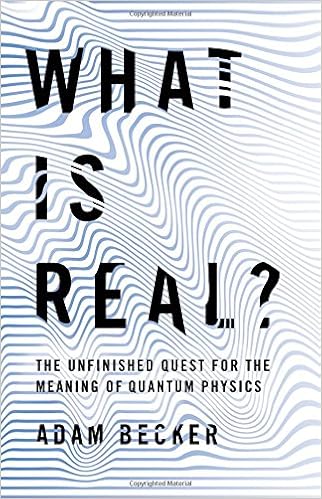
Does anyone remember the microflap a while back when physicist Adam Becker decided to attack Inference Review as an ID-friendly rag over (so it seems) a less-than-flattering review of his book, What Is Real? The Unfinished Quest for the Meaning of Quantum Physics (Basic Books, 2018)?
Things haven’t fared that much better for Becker at The New Atlantis:
In What Is Real? the physicist and science writer Adam Becker offers a history of what his subtitle calls “the unfinished quest for the meaning of quantum physics.” Although it is certainly unfinished, it is, as quests go, a few knights short of a Round Table. After the generation of pioneers, foundational work in quantum mechanics became stigmatized as a fringe pursuit, a career killer. So Becker’s well-written book is part science, part sociology (a study of the extrascientific forces that helped solidify the orthodoxy), and part drama (a story of the ideas and often vivid personalities of some dissenters and the shabby treatment they have often received).
The publisher’s blurb breathlessly promises “the untold story of the heretical thinkers who dared to question the nature of our quantum universe” and a “gripping story of this battle of ideas and the courageous scientists who dared to stand up for truth.” But What Is Real? doesn’t live down to that lurid black-and-white logline. It does make a heartfelt and persuasive case that serious problems with the foundations of quantum mechanics have been persistently, even disgracefully, swept under the carpet.David Guaspari, “Make Physics Real Again” at The New Atlantis
Or two different carpets at once? Perhaps no one quite knows how to deal with the problems and everyone implicitly agrees not to raise the subject?
He summarizes the state of quantum mechanics as “a wildly successful theory, an embarrassment of interpretations, and a major challenge in moving past our theory to the next one.” The small but vigorous community doing work on foundations is less marginal than it used to be. The book’s final section sketches some of its current research and concludes modestly that the wisest course at present is accepting a pluralism of interpretations, or “at least humility.” “Quantum physics is at least approximately correct…. We just don’t know what that means yet. And it’s the job of physics to find out.” David Guaspari, “Make Physics Real Again” at The New Atlantis
Maybe quantum physics is only “approximately correct” and we can’t get more correct down at that level? If so, then what?
Okay, so Becker’s book didn’t satisfy a lot of people. Now back to Inference Review for a minute. Not everyone hates Inference Review:
As for the dark and powerful forces at Inference, the list of their editors is now public (and quite distinguished). Yes, it seems to be Thiel’s money, but, if it’s paying for good science writing (modulo some early dubious choices), so what? Peter Woit, “On Inference” at Not Even Wrong
But Sabine Hossenfelder, author of Lost in Math: How Beauty Leads Physics Astray, and frequent quote-ee around here tells Peter Woit in the combox that she had a bad experience there:
I was contacted by someone from Inference some years ago. They asked me to write an essay for them and made a pretty good financial offer. I put a lot of effort in this and submitted the piece as requested.
After some while I received a revision from an anonymous editor who had garbled up my argument so badly and misrepresented my opinion so much that I could see no common ground and just refused to agree it be published. Luckily I hadn’t signed the letter of agreement, so I had no trouble pulling out of this. (Otoh, I didn’t get the kill fee either.) I then shortened the piece and published it elsewhere. Sabine Hossenfelder, “comment at February 2, 2019 to On Inference” at Not Even Wrong
That’s too bad. We always try to read what Hossenfelder writes.
Follow UD News at Twitter!
See also: Inference Review did not set out to make a fool of Adam Becker (Needless effort, say the editors.)
and
The origin of language remains obscure Some thoughts on two items from Inference Review, one co-authored by Noam Chomsky.